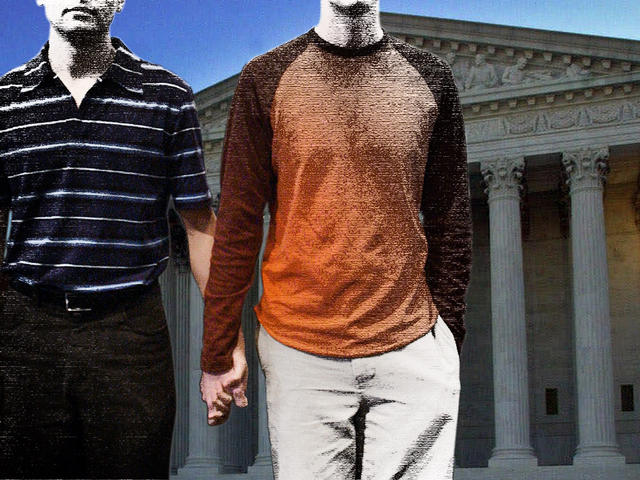Taking the Prop 8 War to the Courts
By now you’ve probably heard that victims of Prop 8 have taken the proposition to California’s courts in an effort to have it ruled unconstitutional. Prop 8, they argue, was the result of religious groups- namely Mormons, Protestants, and Catholics- imposing their religious dogma on a population through a state-run process. Which, if we are to still follow the rule “separation of church and state” that our country was built on, is indeed unconstitutional.
This matter of taking an already-approved proposition to the courts has generated a lot of complex opinions; some people are overtly for or against the move, while others who are pro-gay marriage think it’s going too far. So where should the line be drawn? Some are asking, what’s stopping me from taking Prop 4 or Prop 1A to the courts?
Proposition 8 was, by definition, created in order to restrict certain people’s freedoms. Whether or not it is unconstitutional or flat out morally wrong is up for debate, but it is a simple, solid fact that Prop 8 restricts people’s rights. It prevents people from performing certain actions; that’s just what it does. The people who took it to court did so because they felt it imposed on their personal freedoms.
Propositions like 1A or 7, on the other hand, are more in the gray-area; the building of a high-speed train or spending money on alternative energy has literally nothing to do with you, me, your neighbor, or your local grocer as an individual. Can you imagine the case someone would make if they took Prop 1A to the courts? “Prop 1A is unconstitutional because it wastes money building something we don’t need.” No. It just doesn’t work that way.
A friend recently brought a video to my attention that summed up Prop 8 in a short, funny musical put together by a star-studded cast (Jack Black, Neil Patrich Harris, John C. Reilly, and many more). As silly as it is, it brings up some excellent points about the political and moral mess Prop 8 has unearthed. Watch it here.
Something that struck a particularly resonant chord with me was “Jesus'” short but sweet argument about Christian fundamentalists’ “picking and choosing”. The Bible, like most religious texts, professes some pretty awful things, such as that men are allowed to beat their wives and sell their daughters as slaves. Like any rational person, modern-day Christians ignore these tenets and stick to the ones more suitable for a civilized society. But many of them still choose to follow the tenet that homosexuals are “abominations”.
Why?
Making the choice to ignore some tenets of a religion and hold onto others is in most cases the only thing that keeps religion from tearing the world apart. Otherwise we’d be seeing adulterers and Muslims and Jews and Christians and women and so on being killed in the streets (we kind of do anyways, but we won’t get into that). So why do these religious fundamentalists reject the “crazy” tenets of Christianity, yet stick with the one that is detrimental to homosexuals? It doesn’t seem like they’re so much rejecting the Christian tenets they perceive as crazy and outdated as they are picking and choosing the ones they like best. “Homosexuals are an abomination” just happens to fall into something they’ve been raised to agree with. The difference between this biblical teaching and ones such as “love thy neighbor” is that the “right” ones don’t affect anyone but the person who chooses to follow them; tenets like “your wife has no rights”, “sell your daughter”, and “homos are evil”, on the other hand, have an adverse affect on other people who might just want to be left alone. Nobody has any right to impose their will on another person.
So when you hear about homosexual couples dragging Prop 8 into the courts, stop and think about what drove them to it. Prop 8, which is the imposition of one people’s will on another, did. What created Prop 8? Religious fundamentalism did (thanks in big part to the Mormon Church of Latter Day Saints, who spent over $25 million on Prop 8). What created religious fundamentalism? Picky religious dogmatists. A (legally) passed proposition should stay out of the courts as long as it doesn’t discriminate against a certain group of people. In the case of Prop 8, gays are being singled out and not being allowed to get married because somebody else, somebody who picks and chooses within their religion, thinks they shouldn’t be allowed to.
In other words, a minority is suffering because a majority thinks they are inferior or undeserving of equality. The majority voted positively, and so the minority must deal with it.
Sound familiar?
By ~Tinct
Comments? Leave your intelligent feedback down below or consider following CollegeTimes on Facebook or Twitter to stay updated or to get in touch!
Share This Story:
Please scroll down to leave a comment.


If you would like to clarify the context, I am more than willing to listen. As it stands, I still see passages in the Bible that instigate its followers to exhibit Medieval-like behavior. And the fact that Christians choose to ignore (most of) the Bible’s barbaric passages while following other oppressive ones is, as far as I’m concerned, picking-and-choosing.
In case anybody has interpreted it as such (because some forum troll always does), there is no anti-Christian sentiment in this article. I recognize that Judaism and Islam, probably other religions, also have outdated tenets, some of which they still choose to follow as well.
As Jack Black says, if you’re going to pick and choose with your religion, please choose love instead of hate. If religion-goers followed that simple mantra, one akin to live-and-let-live, there would a lot, lot, lot less anti-religion sentiments floating around. I just want to see people accepting others for who they are as long as those people exhibit equal acceptance.
I dont know about other religions, but as far as the Church of Jesus Christ of Latter Day Saints is concerned, they believe that the Book of Morman is the word of God. Also the Bible, but as long as it is translated correctly.
Yea, and about bringing out passages, it’s important to know the context behind them. Just reading the passages alone does nothing.
And yet those passages are still in the Bible. Interesting. Please explain how these passages make my point “irrelevant”.
It’s always interesting that those ignorant of the bible always choose the same passages that seem to support their point of view, yet ironically make your point irrelevant. The bible deserves more than a quick google search.
I was going off of what the video said. I couldn’t find a specific example of wife-beating, just one that can be interpreted as such, but for the sake of clarity I will replace thw wife-beating example. However, here are just a couple other ridiculous verses pertaining to slavery and women’s rights:
Slavery (ambiguous):
Joel 3:8
And I will sell your sons and your daughters into the hand of the children of Judah, and they shall sell them to the Sabeans, to a people far off: for the LORD hath spoken (it).
Women’s rights:
Genesis 3:16 (wife-beating?)
Unto the woman he said, I will greatly multiply thy sorrow and thy conception; in sorrow thou shalt bring forth children; and thy desire shall be to thy husband, and he shall rule over thee.
1 Corinthians 14:34-36
Let your women keep silence in the churches: for it is not permitted unto them to speak; but they are commanded to be under obedience as also saith the law. And if they will learn any thing, let them ask their husbands at home: for it is a shame for women to speak in the church.
Colossians 3:18
Wives, submit yourselves unto your own husbands, as it is fit in the Lord.
Where in the Bible does it say the things you say it does? I would like to see it first hand.